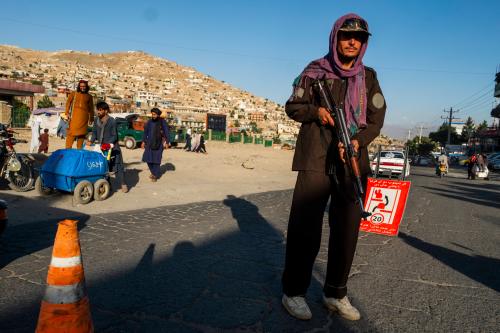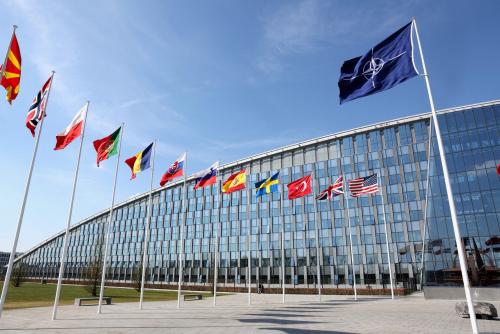The horrific terrorist attack against the Crocus concert hall in Moscow has been claimed by the Islamic State Khorasan Province (ISKP), the same Afghanistan-based terrorist group that bombed the Kabul airport’s Abbey Gate in August 2021, killing 13 U.S. soldiers and 170 Afghans. The United States has also attributed the attack to ISKP. Yet to deflect attention from the Russian security services’ incompetence and to instrumentalize the attack to increase Vladimir Putin’s authoritarian grip and war efforts in Ukraine, Russia’s propaganda is seeking to link the attack to Ukraine. This disinformation is part and parcel of Russia’s (and Iran’s) persistent lies that the United States created ISKP, as Russian interlocutors for years claimed to me and others.
Although the ISKP attack may complicate Russia’s relations with the Taliban, it is unlikely to alter them fundamentally. While the Taliban’s repeated promise that it would prevent international attacks from Afghan soil is further discredited, ISKP is the one terrorist group that the Taliban has been fighting with determination and consistency even after coming to power. Russia might ask the Taliban for further specific actions, but it has adjusted itself to Taliban rule, supporting the Taliban at multilateral fora, and it doesn’t really have alternatives in Afghanistan.
ISKP’s international terrorism
In its propaganda, ISKP has long highlighted Russia as a key international villain and target. ISKP grievances include Russia’s support for the Bashar Assad regime in Syria, repression of Muslims in Chechnya and other parts of the world, and Russian counterinsurgency in Afghanistan. The United States, Iran, Pakistan, and India also feature high on ISKP’s list of enemies.
ISKP’s external operations against a wide range of international actors have increased over the past two years, as its prospects of conquering a significant part of Afghanistan from the Taliban have diminished. For example, in April 2022, ISKP fired a salvo of Katyusha rockets against the Uzbek city of Termez. In May 2022, it launched a similar barrage against Tajikistan. In October 2022, its attack on a Shiite shrine in Iran killed many worshipers, as did its other Iran operations—in April 2023 in Shiraz and in January 2024 in Kamran.
ISKP has also repeatedly attacked international targets in Afghanistan: the Russian and Pakistani embassies in Kabul in September and December 2022 and a hotel frequented by Chinese businessmen.
ISKP has been actively and successfully recruiting outside of Afghanistan, including in Pakistan, Tajikistan, Central Asia, and Syria. Russia claims that the Crocus attack perpetrators it captured were from Tajikistan.
ISKP’s external operations and attacks against international targets in Afghanistan seek to demonstrate its perseverance despite the Taliban’s military actions and undermine the Taliban’s successful external engagements. ISKP likely calculates that by souring the Taliban’s relations with Russia and Afghanistan’s neighbors, it can augment Afghanistan’s economic woes and reduce financial flows to the Taliban, destabilizing its rule. ISKP also likely hopes that by inducing the Taliban’s regional isolation, it can grow more powerful on the battlefield and prevail in any ensuing Afghan civil war, which Russia and regional actors want to avoid above all else.
ISKP-Taliban relations
ISKP emerged in Afghanistan a decade ago in direct opposition to the Taliban. Its core members were Taliban commanders who, for various reasons, such as their bloodthirstiness, ran afoul of the then Taliban leader, Akhtar Mansour. Some of the commanders Mansour fired sought to incite an anti-Shiite sectarian war in Afghanistan; Mansour opposed this, as he was actively courting ethnic minorities to join the Taliban.
The Taliban has been fighting ISKP with determination and resolve since the latter’s inception. In 2016 and 2017, the Taliban’s military pressure forced ISKP cadres into eastern Afghanistan where they extensively recruited Pakistani militants and fighters from dissatisfied local tribes. Jihadists from abroad joined the new Islamic State branch, and ISKP also intensively intermingled with another militant group in eastern Afghanistan: Tehrik-e-Taliban Pakistan (TTP). (The Taliban’s persistent fear that TTP members might join ISKP and fight the Taliban explains why the Taliban has not been willing to crack down on the TTP despite its intensified attacks against Pakistan and Pakistan’s pressure on the Taliban to do so.)
From 2018-2019, the Taliban’s ground operations against ISKP in Afghanistan’s Nangarhar province crucially supplemented the U.S. air campaign against the group, smashed its rural base, and dispersed it into Afghanistan’s northern and urban areas.
In April 2023, the Taliban killed the ISKP commander who organized the August 2021 Kabul airport attack. It has eliminated other ISKP commanders, including the group’s presumed deputy commander, interim leader, head of intelligence, and shadow minister of justice. As a result of Taliban actions, ISKP attacks in Afghanistan decreased last year. In late 2022, the Taliban also presumably decimated ISKP cells targeting Uzbekistan & Tajikistan.
ISKP is the only terrorist group in Afghanistan that the Taliban actively fights. Due to the Taliban’s ideological bent, global jihadist obligations and debts, and decades of intermarriage with other militant actors, it has merely sought to manage Afghanistan’s other terrorist groups, such as the TTP, al-Qaida, and Central Asian militants. The Taliban moves the groups away from its neighbors’ borders, places them (temporarily) in special camps, and separates the fighters from their families. However, the Taliban has not been willing to arrest, kill, or extradite them. The Taliban also merely manages Uyghur militants, China’s top concern, even though it looks to China for badly-needed economic investment and trade far more than Russia.
Russia’s and regional counterterrorism diplomacy
Russia, regional actors, and the West are highly concerned with preventing terrorism spillovers from Afghanistan, and all remain sensitive to the risk that an Afghan civil war would provide a dangerous breeding ground for terrorists and stimulate much larger migration flows. To meet these challenges, Russia, regional actors, the United States, and Great Britain have maintained a counterterrorism dialogue with the Taliban.
Russia, Iran, and China have reconciled themselves to Taliban rule. The three are lukewarm toward Western economic sanctions on the Taliban, such as the freeze of the Afghan central bank’s assets, and unmotivated by issues of human rights, civil liberties, and women’s rights. They have even given up advocating for the representation of their ethnic kin powerbrokers in the Taliban government.
Russia has been developing its relations with the Taliban for years. By 2017, Russia was providing the Taliban with weapons and intelligence to fight ISKP and the United States. Russia sought to make the United States militarily bleed and entangle itself in Afghanistan even as Moscow opposed long-term U.S. bases in Afghanistan. Since the U.S. withdrawal in 2021, Russia has labored to reduce U.S. influence in the region. However, Russia’s efforts to position itself as an Afghan kingmaker haven’t panned out. Like everyone else, Russia has not been able to move the Taliban on internal rule in Afghanistan even though it has tacitly supported the Taliban in various international fora, including in a recent multilateral meeting in Doha by not insisting on a new U.N. special envoy whom the Taliban opposes. Along with China, Russia has condemned Western sanctions and called for engagement with the Taliban (though Russia has not pushed to remove the sanctions at the United Nations). But the Taliban has continued to snub Moscow on international diplomacy at various times.
China has gone the furthest in normalizing relations with the Taliban by accepting the latter’s ambassador to Beijing in December 2023. Chinese businesses have also slightly increased their exploration of trade and resource extraction opportunities in Afghanistan packaged within a renewed possibility that the Taliban-run Afghanistan may join the Belt and Road Initiative.
Surprisingly, Iran has developed the deepest access to the Taliban’s reclusive Haibatullah and his inner circle, despite Tehran’s long-standing sectarian rivalries with the Taliban and recent military skirmishes over water. Like others, Tehran calculates that it is stuck with the Taliban. Moreover, Kandahar and Kabul insiders tell me that the Taliban has permitted Tehran to continue recruiting fatemiyoun Shiite brigades in Afghanistan for its “axis of resistance” operations in the Middle East. It is notable that after the January Kamran bombing, Tehran did not strike targets in Afghanistan and instead hit alleged assets of Jaish al-Adl, another militant Sunni group in Pakistan.
With less influence over the Taliban than Iran, Russia should note Iran’s restraint. Moscow can ask the Taliban for specific actions against ISKP, and the Taliban is likely to grant them. But beyond that, Moscow can do little more than boost its military readiness in Central Asia —including at its bases in Kyrgyzstan and Tajikistan, something it had already signaled before the Crocus attack—and become more diligent about monitoring and stemming jihadi terrorist networks in Russia.
Moscow’s effectiveness with the Taliban is as constrained as everyone else’s, and its leverage is even more limited. Russia provides virtually no humanitarian aid to Afghanistan—not that the West has been able to translate it into inducing less odious internal Afghan policies—and its economic engagement with Afghanistan is small. Russia may threaten the Taliban with opposition to lifting sanctions and travel bans against the Taliban, but since there is no current prospect for their removal anyway, little leverage results. And building up Afghan alternatives, i.e., the very weak National Resistance Front that has been flailing in its efforts to fight the Taliban, would take a long time and bring uncertain payoffs.
Russia may feel frustrated with the Taliban over the Crocus attack, but its false-flag Ukraine propaganda aside, it has few cards to play with the Taliban.
The Brookings Institution is committed to quality, independence, and impact.
We are supported by a diverse array of funders. In line with our values and policies, each Brookings publication represents the sole views of its author(s).






Commentary
Russia-Afghanistan relations in the aftermath of the Moscow attack
March 28, 2024